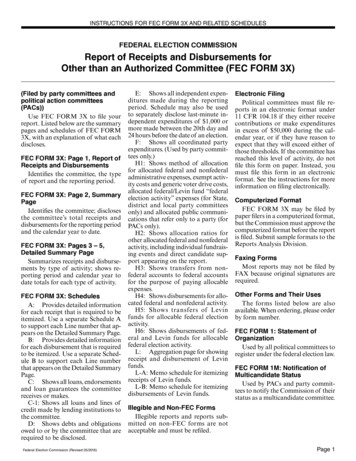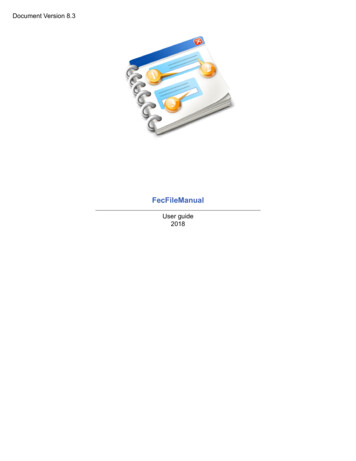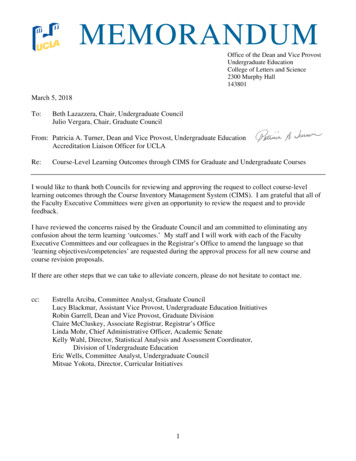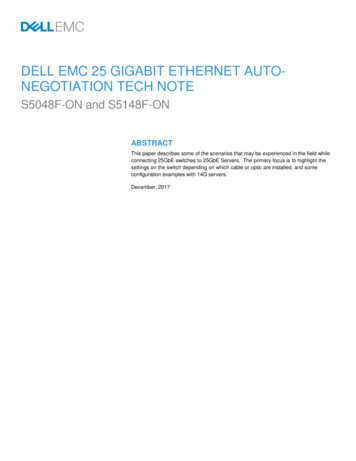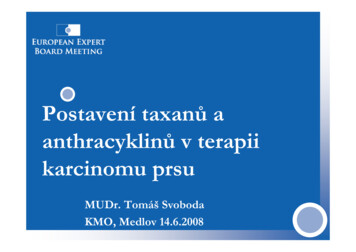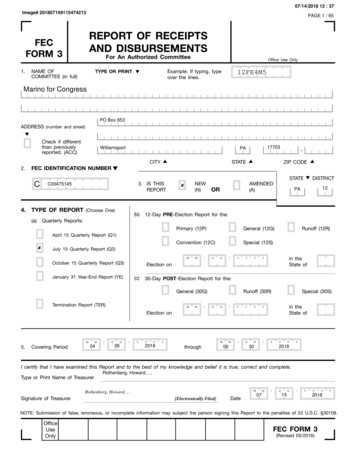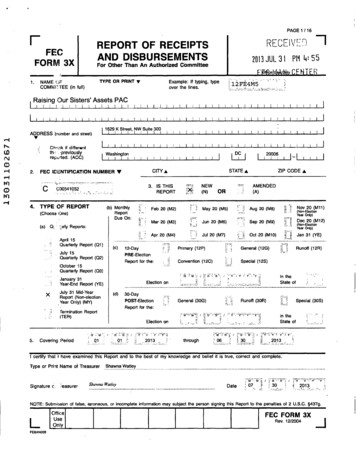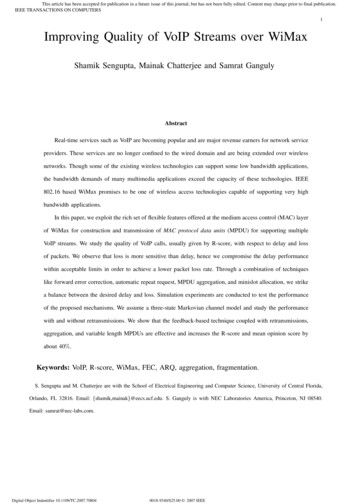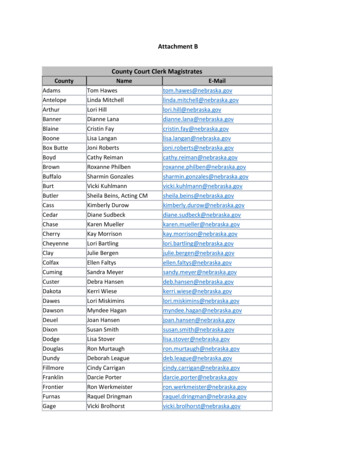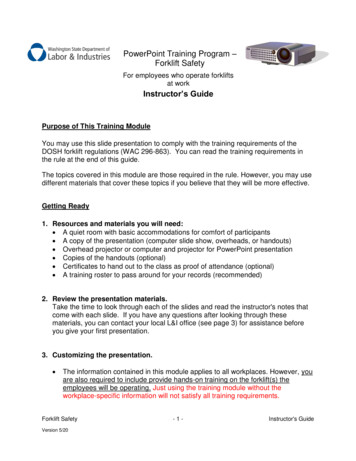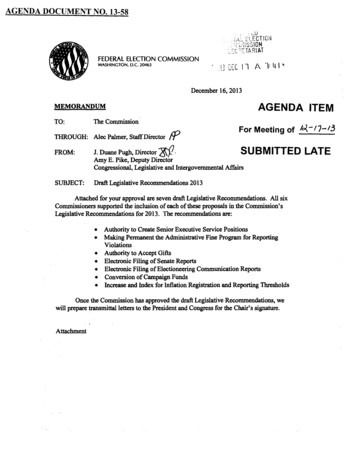
Transcription
AGENDA DOCUMENT NO. 13-58FEDERAl ElECTION COMMISSIONWASHINGTON, D.C. 20463December 16, 2013AGENDA ITEMMEMORANDUMTO:The CommissionTHROUGH: Alec Palmer, Staff DirectorIf For Meeting of ld{-t7-t3J§\{1.FROM:J. Duane Pugh, DirectorSUBMITTEDAmy E. Pike, Deputy DirectorCongressional, Legislative and Intergovernmental AffairsSUBJECT:Draft Legislative Recommendations 2013Attached for your approval are seven draft Legislative Recommendations. All sixCommissioners supported the inclusion of each ofthese proposals in the Commission'sLegislative Recommendations for 2013. The recommendations are: Authority to Create Senior Executive Service PositionsMaking Permanent the Administrative Fine Program for ReportingViolationsAuthority to Accept GiftsElectronic Filing of Senate ReportsElectronic Filing of Electioneering Communication ReportsConversion of Campaign FundsIncrease and Index for Inflation Registration and Reporting ThresholdsOnce the Commission has approved the draft Legislative Recommendations, wewill prepare transmittal letters to the President and Congress for the Chair's signature.AttachmentLATE
Authority to Create Senior Executive Service PositionsSections: 5 U.S.C. § 3132(a)(l)2 U.S.C. § 437c(f)(l)Recommendation: Congress should delete the exclusion of the Federal Election Commissionfrom eligibility for the Senior Executive Service (SES) under the Civil Service Reform Act of1978 (as amended by the Federal Election Campaign Act Amendments of 1979). See Public Law96-187, § 203,93 Stat. 1339, 1368 (1980), codified at 5 U.S.C. § 3132(a)(1)(C). Additionally,Congress should revise section 310 of the Federal Election Campaign Act to delink the salariesof the Staff Director and the General Counsel from Level IV and Level V of the ExecutiveSchedule.Explanation: The Commission believes that these statutory changes are needed to bring theCommission's personnel structure in line with that of other comparable federal agencies. Thiswould ensure that the Commission is better able to compete with other government agencies inrecruiting and retaining key management personnel.Currently, the Commission is prohibited by law from creating Senior Executive Servicepositions within the agency. 5 U.S.C. § 3132(a)(1)(C). The Commission recommends that it bemade eligible to create Senior Executive Service positions because: (1) the agency currently hasseveral top management positions that the Commission believes would fully satisfy the criteriafor SES positions set forth in 5 U.S.C. § 3132 (e.g., directing the work of an organizational unit,monitoring progress toward organizational goals, etc.); and (2) the SES system would provideinstitutional benefits to the agency and agency employees.As a result of the current prohibition, the Commission's senior managers (other than theStaff Director and the General Counsel) are employed in Senior Level positions. The currentSenior Level positions (the Chief Financial Officer, four Deputy Staff Directors, two DeputyGeneral Counsels, and three Associate General Counsels) oversee major programmatic areas andsupervise not only staff, but other managers as well. Although these ten top managementpositions are designated as Senior Level, because supervisory and executive responsibilitiesoccupy 100% of the time of the employees filling these positions, the positions would be moreappropriately designated as SES. 1The Commission is also cognizant of a recently launched Senior Executive ServiceInitiative? This initiative includes a collaborative, cross-agency reinvigoration in the training,development and qualification of SES-certified employees to meet the staffing needs of theIn fact, OPM's guidance on the Senior Level positions indicates that the Senior Level system is generallyfor positions in which supervisory duties occupy less than 25% of the employee's time. ons/ (last visitedDec. 5, 2013). OPM's guidance does note, however, that "in a few agencies [such as the Federal ElectionCommission] that are statutorily exempt from inclusion in the Senior Executive Service (SES), executive positionsare staffed with SL employees."2See OMB/OPM Memorandum for the Senior Executive Service (Feb. 18, 2011) available athttp://archive.wm.gov/ses/QMB OPM SESMemo,pdf(last visited Dec. 5, 2013).1
government in view of the anticipated loss of SES qualified personnel due to attrition in the nearfuture. This amendment, if enacted, would afford existing FEC staff and future staff theopportunity to participate in and benefit professionally from this initiative, and should allow theagency to develop an increasing level of competence in its labor force.Additionally, recent legislation has put the salary ranges for Senior Executive Serviceemployees and Senior Level employees in parity. See Senior Professional Performance Act of2008, Public Law 110-372, 122 Stat. 4043 (2008). In addition, like SES employees, SeniorLevel employees may now carry over 720 hours of annual leave into the next year, rather thanthe previous Senior Level limit of240. Nonetheless, the SES system would provide institutionalbenefits to the Commission and its employees by enhancing the quality and quantity of the poolof persons available to fill vacancies that may arise.SES candidates must go through a competitive selection process in order to enter aCandidate Development Program ("CDP"). Completion of a CDP by candidates within theagency ensures that a cadre of SES-approved employees is available for selection and therebyassists in good succession planning. In addition, a fundamental concept underlying the SESsystem is enabling agencies to hire experienced and skilled leaders from a government-wide, notjust intra-agency, pool with relative ease and with the assurance that all such employees havemet the same standards of development and experience. For example, because SES-certifiedapplicants from outside the agency will have met all of the Executive Core Qualifications, theCommission would be able to evaluate their applications with the assurance that fundamentalcompetencies have already been developed.The current provision in FECA specifies that the Staff Director and General Counsel areto be paid at Level IV and Level V of the Executive Schedule, respectively. Both positionssupervise personnel at the GS-15 and Senior Level pay scales, which often provide highersalaries than Levels IV and Vofthe Executive Schedule. The Staff Director and GeneralCounsel have significant responsibilities and oversight duties with respect to both administrativeand legal areas, as well as management over almost all agency personnel. According torecruiting specialists working with the Commission, the current limit makes attracting a strongpool of applicants to these positions more challenging. The appointment and retention of thesekey leaders has been identified as an ongoing challenge to the Commission by the InspectorGeneral in recent Performance and Accountability Reports, and the General Counsel's position iscurrently vacant.The Commission proposes to remove the statutory references to the Executive Scheduleso that the Staff Director and General Counsel would be compensated under the same scheduleas the Commission's other senior managers. This revision will address the current situationwhere the Commission's top managers are compensated at a lower rate than many of their directreports, and will ensure that the Commission can retain highly qualified individuals to serve inthose positions as well as enable it to remain competitive in the marketplace for Federalexecutives when filing the current vacancy or when further vacancies arise. This change will notrequire an increase in the Commission's appropriation request.2
Accordingly, the Commission believes that the positions ofStaffDirector and GeneralCounsel, as well as the current Senior Level positions within the agency, would be moreappropriately categorized as SES positions and that any future Senior Level positions should becreated in the SES. Because salary ranges for Senior Executive Service employees and SeniorLevel employees are in parity, as discussed above, permitting the Commission to convert itsSenior Level positions into Senior Executive Service positions will affect the salary expenses foronly two positions: the Staff Director and the General Counsel.Legislative Language:Section 310(f)(l) ofthe Federal Election Campaign Act of 1971 (2 U.S.C. § 437c(f)(l)) isamended by striking the second and third sentences.Section 3132(a)(l)(C) of Title 5, United States Code, is amended by striking ''the FederalElection Commission, or''.3
Making Permanent the Administrative Fine Program for Reporting ViolationsSection: 2 U.S.C. § 437gRecommendation: Congress should make permanent the Commission's authority to assessadministrative fines for straightforward violations of the law requiring timely reporting ofreceipts and disbmsements. The Commission's current Administrative Fine Program only coversviolations that relate to reporting periods through December 31, 2013.Explanation: On October 16, 2008, President Bush signed legislation that extended theAdministrative Fine Program to cover violations of2 U.S.C. § 434(a) that relate to reportingperiods through December 31, 2013. See Public Law 110-433, 122 Stat. 4971 (2008). Since theAdministrative Fine program was implemented in 2000 through the end of fiscal year 2013, theCommission has processed and made public 2,623 cases, with 4.9 million in fines assessed.The Administrative Fine Program has been remarkably successful: over the comse of theprogram, the number of late and nonfiled reports has dramatically decreased. For election cycles1992 through 2000, an average of 21% of campaign finance reports were filed late. Since theinception of the Administrative Fine Program, the percentage of late reports has dropped tobelow 100/o. As a result, the Administrative Fine Program has become an integral part of theCommission's mission to administer and enforce the Act. With fewer late reports and fewerchallenges to administrative fines, the Commission has been able to reduce the number ofemployees who work on this program. By making the program permanent, Congress wouldensure that the Commission would not lose one of the most cost-effective and successfulprograms in its history.Under the Administrative Fine Program, the Commission considers reports to be filedlate if they are received after the due date, but within 30 days of that due date. Election-sensitivereports are considered late if they are filed after their due date, but at least five days before theelection. (Election sensitive reports are those filed immediately before an election and includepre-primary, pre-special, pre-general, October quarterly and October monthly reports.)Committees filing reports after these dates are considered nonfilers. Civil money penalties forlate reports are determined by the amount of activity on the report, the number of days the reportwas late and any prior penalties for violations under the administrative fine regulations.Penalties for nonfiled reports are determined by the estimated amount of activity on the reportand any prior violations. Committees have the option to either pay the civil penalty assessed orchallenge the Commission's finding, proposed penalty or both.On November 18,2013, the House of Representatives passed H.R 3487, which wouldextend the authority for the Commission's Administrative Fines Program to reporting periodsthrough the end of2018. That bill is pending in the Senate. In the absence of permanentauthority, the Commission supports this extension of the Administrative Fines Program.4
Legislative Language:Section 309(a)(4)(C) ofthe Federal Election Campaign Act of 1971 (2 U.S.C. § 437g(a)(4)(C))is amended to read as follows: "(iv) This subparagraph shall apply with respect to violations thatrelate to reporting periods that begin on or after January 1, 2000.".5
Authority to Accept GiftsSection: 2 U.S.C. § 437dRecommendation: Congress should authorize the Commission to accept gifts that will assist theCommission in carrying out its functions.Explanation: Congress has provided authority to numerous Federal departments and agencies toaccept gifts that will assist that department or agency in carrying out its duties. See, e.g., 5U.S.C. app. § 403(b)(l) (Office of Government Ethics); 28 U.S.C. § 524(d) (Department ofJustice); 40 U.S.C. § 3175 (General Services Administration). In the absence of specificstatutory authority, a government agency may not accept donations of goods or services fromprivate sources. See U.S. Gov't Accountability Office, GAO B-289903, Gifts ofGoods andServices to the Government (2002). The Commission is currently without such authority, butwishes to be able to accept gifts, should any offers be received.State disclosure agencies have received donated services and products for informationtechnology projects to promote and enhance the transparency of data disclosed to thegovernment. Such donations have come from individuals or organizations that support theagencies' mission of enhancing transparency.The Federal Election Commission would like to be authorized to accept similar gifts andwould use those gifts to continue its efforts to facilitate transparency in the federal campaignfinance system through a state-of-the-art, web-based public disclosure system, ensuring that thevast quantity of campaign finance data is available to the public quickly and in a manner that iseasy for the general public to sort and search. Such gifts are an example of the gifts theCommission would be authorized to accept under the proposal, and all accepted gifts would beused to assist the Commission in carrying out its mission.The Commission recognizes that vigilant review would be required to limit conflicts ofinterest and would promulgate a regulation to disclose any gifts prior to acceptance.Legislative Language:Section 311 of the Federal Election Campaign Act of 1971 (2 U.S.C.§ 437d) is amended byadding at the end the following new subsection:"(f) Authority to accept gifts."(1)The Commission is authorized to accept and utilize on behalf of theUnited States, any gift, donation, bequest, or devise of money, use offacilities, personal property, or services for the purpose of aiding orfacilitating the work of the Federal Election Commission.6
"(2)No gift may be accepted"{A)that attaches conditions inconsistent with applicable laws orregulations; or"(B)that is conditioned upon or will require the expenditure ofappropriated funds that are not available to the Federal ElectionCommission."(3)Prior to accepting any gift pursuant to the authority provided by thissubsection, the Commission shall promulgate a regulation that requires thepublic disclosure of the donor of the gift, the date of the gift, and adescription of the nature, value and intended use of the gift."7
Electronic Filing of Senate ReportsSections: 2 U.S.C. §§ 432(g) and 434(a)(ll)Recommendation: Congress should require electronic filing for all Senate candidates and theirauthorized committees (and for those persons and political committees filing designations,statements, reports or notifications pertaining only to Senate elections) if they have, or havereason to expect to have, aggregate contributions or expenditures in excess of the thresholdamount determined by the Commission.Explanation: The Treasury and General Government Appropriations Act, 2000, Public Law106-58, § 639, 113 Stat. 430, 476 (1999), required that the Commission make electronic filingmandatory for political committees and other persons required to file with the Commission who,. in a calendar year, have, or have reason to expect to have, total contributions or totalexpenditures exceeding a threshold amount set by the Commission (which is currently 50,000).However, because Senate candidates file with the Secretary of the Senate, the mandatoryelectronic filing provisions do not apply to Senate candidates and their committees. TheCommission notes that legislation to require Senate campaigns to file reports with the FederalElection Commission, rather than the Secretary of the Senate, has been referred out of committeeand is pending before the Senate. See Senate Campaign Disclosure Parity Act, S. 375, 113thCong. (20 13). This legislation, if passed, would make those committees subject to mandatoryelectronic filing at the Federal Election Commission.Compared to data from paper reports, data from electronically filed reports is received,processed and disseminated more easily and efficiently, resulting in better use of resources. Infact, the Commission estimates at least 430,000 per year in costs directly attributable to currentSenate filing procedures would be saved by requiring electronic filing. In addition to thesesavings for the Commission, the Secretary of the Senate would also realize savings, andcommittees that file reports could substantially reduce their processing costs. Reports that arefiled electronically are normally available, and may be downloaded, within minutes. In contrast,the time between the receipt of a report filed through the paper filing system and its initialappearance on the Commission's web site is 48 hours. Moreover, a Senate campaign filing oftenconsists of thousands of pages, and data from the filings themselves take up to 30 days to beintegrated into the Commission's searchable databases. If such reports were electronically filed,the data could be integrated within a few days.Electronic filing is generally unaffected by disruptions in the delivery of mail, such asthose arising from security measures put in place after the discovery of anthrax powder and ricinin mail in 2001, 2004 and very recently in 2013. Electronic filings are not subject to thesedelays.8
Legislative Language:Section 302(g) of the Federal Election Campaign Act of 1971 (2 U.S.C. § 432(g)) is amended toread as follows:"(g). Filing With the Commission-All designations, statements, and reports required to be filedunder this Act shall be filed with the Commission."9
Eledronic Filing of Electioneering Communication ReportsSection: 2 U.S.C. § 434(aX11)(AXi)Recommendation: Congress should require reports of electioneering communications to be filedelectronically with the Commission, rather than on paper.Explanation: The Treasury and General Government Appropriations Act, 2000, Public Law 10658, § 639, 113 Stat. 430, 476 (1999), required that the Commission make electronic filingmandatory for political committees and other persons required to file with the Commission who,in a calendar year, have, or have reason to expect to have, total contributions or totalexpenditures exceeding a threshold amount set by the Commission (which is currently 50,000).In addition, many independent expenditure reports are already subject to mandatory electronicfiling under 2 U.S.C. § 434(a)(11XA)(i). However, because electioneering communicationreports are not filed by political committees, and because funds spent for electioneeringcommunications are reported as "disbursements," and not as "expenditures," the mandatoryelectronic filing provisions generally do not apply to electioneering communication reports.Compared to data from paper reports, data from electronically filed reports is received,processed and disseminated more easily and efficiently, resulting in better use of resources.Reports that are filed electronically are normally available, and may be downloaded, withinminutes. In contrast, the time between the receipt of a report filed through the paper filing systemand its initial appearance on the Commission's web site is 48 hours.Electronic filing is generally unaffected by disruptions in the delivery of mail, such asthose arising from security measures put in place after the discovery of anthrax powder and ricinin mail in 2001 and 2004. Because of these security measures, the Commission's receipt ofmailed paper filings is delayed. In contrast, electronic filings are not subject to these delays.More and more, electioneering communications comprise a significant part of the overallelection-related communications during an election. In the 2011-2012 election cycle, reportswere filed with the Commission documenting more than 15 million in electioneeringcommunications.Only entities that report more than 50,000 of electioneering communications would besubject to mandatory electronic filing under the proposal. The current threshold selected by theCommission ensures that entities with limited financial resources can file reports on paper, whichavoids the limited cost of internet access and a computer sufficient to file reports. In the 20112012 period, only 24 filers of electioneering communication reports disclosed financial activityin excess of the current 50,000 threshold, and thus would have been subject to mandatoryelectronic filing under the proposal. Of these 24 filers, 22 (or 92%) reported electioneeringcommunications in excess of 100,000, which certainly suggests the organizations likelyaffected by the proposal have more than sufficient resources to meet the low costs of electronicfiling.10
Legislative Language:Section 304(a)(ll)(A)(i) ofthe Federal Election Campaign Act of 1971 (2 U.S.C.§ 434(a)(ll)(A)(i)) is amended by inserting "or makes or has reason to expect to makeelectioneering communications" after "expenditures".11
Conversion of Campaign FundsSection: 2 U.S.C. § 439aRecommendation: Congress should amend the Federal Election Campaign Act's prohibition ofthe personal use of campaign funds to extend its reach to all political committees.Explanation: In 2007, the Department of Justice noted, "[r]ecent years have seen a dramatic risein the number of cases in which candidates and campaign fiduciaries steal money that has beencontributed to a candidate or political committee for the pwpose of electing the candidate or thecandidates supported by the political committee." See U.S. Department of Justice, FederalProsecution ofElection Offenses, 194-95 (7111 ed. May 2007). In fact, the Commission has seen asubstantial number of instances where individuals with access to the funds received by politicalcommittees have used such funds to make unauthorized disbursements to pay for their ownpersonal expenses.The Federal Election Campaign Act makes it illegal for an individual to use contributionsaccepted by a candidate or a candidate's committee for his or her own personal use, i.e. to fulfillany commitment, obligation, or expense that would exist irrespective of the candidate's electioncampaign or duties as a holder of Federal office. See 2 U.S.C. § 439a(b). However, nocorresponding provision covers individuals who convert contributions received by partycommittees, separate segregated funds, leadership PACs, and other political committees to theirown personal use, including through theft or embezzlement While other provisions of FECAare sometimes adequate to address these types of unauthorized disbursements, sometimes theyare not.Leadership PACs present a particularly compelling case for this amendment. The closerelationships of leadership PACs to the officeholders who sponsor them make leadership PACsvery similar to authorized committees, which are already covered by the personal useprohibition. Because leadership PACs were not expressly recognized in FECA 1mtil a 2007amendment, Congress might not have considered the application of the personal use prohibitionto this particular type of political committee.The Commission proposes to revise 2 U.S.C. § 439a(b) to address this growing problemby prohibiting the use by any person of any political committee's receipts for expenses thatwould exist irrespective of the political committee's political activities. Political activities wouldinclude activities in connection with a Federal election, as well as activities in furtherance of apolitical committee's policy or educational objectives and other legitimate committee functionsand related administrative expenses. Such an amendment would provide for coherent andconsistent application of FECA.12
Legislative Language:Section 313 of the Federal Election Campaign Act of1971 (2 U.S.C. § 439a) is amended:(1)in paragraph (b)(l), by inserting "or a receipt accepted by any other politicalcommittee" after "subsection (a)";(2)in paragraph (bX2), by striking "contribution or donation" and replacing with"contribution, donation, or receipt";(3)in paragraph (bX2), by striking "campaign or individual's duties as a holder ofFederal office," and inserting "campaign, individual's duties as a holder ofFederal office, or political committee's political activities,".13
Increase and Index for Inflation Registration and Reporting ThresholdsSections: 2 U.S.C. §§ 431 and 434Recommendation: Congress should increase and index for inflation certain registration andreporting thresholds in the Federal Election Campaign Act that have not been changed since the1970s.Explanation: Most of the Federal Election Campaign Act's ("FECA 's") contribution limits andregistration and reporting thresholds were set in the 1970s. Because over twenty years ofinflation had effectively reduced FECA 's contribution limits in real dollars, the BipartisanCampaign Reform Act of2002 ("BCRA ") increased most of the Act's contribution limits toadjust for some of the effects of inflation. Furthermore, BCRA indexed these limits for inflationto address inflation in future. The Commission proposes extending this approach to registrationand reporting thresholds, which have been effectively reduced by inflation since those thresholdswere established in 1971 or 1979.Since 1971, FECA has provided that any group of persons that receives contributions ormakes expenditures in excess of 1,000 in a calendar year must register and report as a politicalcommittee. 2 U.S.C. § 431(4)(A). FECA also requires political committees to abide by thecontributions limits and source prohibitions specified in FECA. Since 1979, FECA has providedthat local political party organizations are also subject to a 1,000 threshold for (federal) politicalcommittee status. 2 U.S.C. § 431(4)(C). The Commission recommends that Congress increasethese thresholds to amounts determined appropriate by Congress, and then index those amountsfor inflation to prevent erosion in the future.Raising this threshold would be particularly beneficial for local and Congressionaldistrict committees of political parties. These organizations frequently breach the 1,000threshold. An increased threshold would permit limited spending on federal elections withouttriggering federal political committee status for local and Congressional district committees ofpolitical parties.Since 1979, FECA has required persons (other than political committees) who makeindependent expenditures in excess of 250 in a calendar year to report such expenditures to theCommission. 2 U.S.C. § 434(c)(l). The Commission recommends that Congress increase thisthreshold to an amount determined by Congress, and index this amount for inflation.Increasing these thresholds would take into account many years of inflation and thegeneral increase in campaign cost and ease the compliance burdens on smaller organizations andindividuals. Additionally, by increasing the thresholds, Congress would exempt someindividuals and small organizations that engage in only minimal spending from the Act'sregistration and reporting requirements. Increasing the registration and reporting thresholds tocompensate for inflation would leave significant financial activity subject to regulation asintended by Congress when it enacted the FECA.14
Legislative language:Section 301 of the Federal Election Campaign Act of 1971 (2 U.S.C. § 431) is amended:in paragraph (4)(A), by striking both references to " 1,000" and by inserting a(1)dollar amount determined by Congress; andin paragraph (4)(C), by striking both references to " 5,000" and both references to(2)" 1,000" and by inserting dollar amounts detennined by Congress.Section 304 of the Federal Election Campaign Act of 1971 (2 U.S.C. § 434) is amended, inparagraph (c)(1) by striking " 250" and inserting a dollar amount determined by C{)ngress.Section 315(c) of the Federal Election Campaign Act of1971 (2 U.S.C. § 441a(c)) is amended(1)in paragraph (1), by inserting after subparagraph (C) the following:"(D)In any calendar year after 2013-(i) a threshold established by section 301(4)(A) or (4)(C), or section304(c)(1) shall be increased by the percent difference determined undersubparagraph (A);(ii) each amount so increased shall remain in effect for the calendar year;and(iii) if any amount after adjustment under clause (i) is not a multiple of 100, such amount shall be rounded to the nearest multiple of 100.";(2)in paragraph (2)(B)(i), by deleting "and" at the end;(3)in paragraph (2)(B)(ii), by replacing the period at the end with "; and"; and(4)by inserting after paragraph (2)(B)(ii) the following:"(iii) for purposes of section 301(4)(A) or (4)(C), or section 304(c)(1), calendar year 2013.".15
created in the SES. Because salary ranges for Senior Executive Service employees and Senior Level employees are in parity, as discussed above, permitting the Commission to convert its Senior Level positions into Senior Executive Service positions will affect the salary expenses for only two positions: the Staff Director and the General Counsel.
